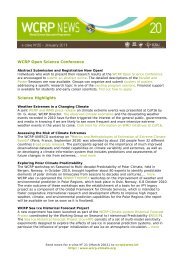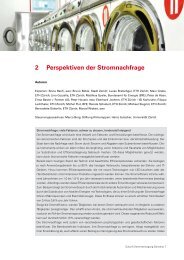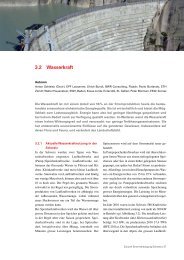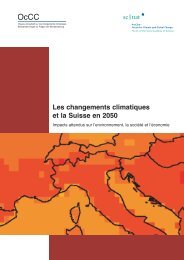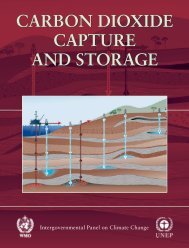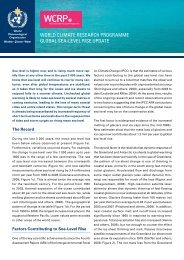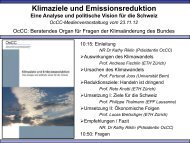Climate Change and Switzerland 2050 - OcCC - SCNAT
Climate Change and Switzerland 2050 - OcCC - SCNAT
Climate Change and Switzerland 2050 - OcCC - SCNAT
You also want an ePaper? Increase the reach of your titles
YUMPU automatically turns print PDFs into web optimized ePapers that Google loves.
106 <strong>Climate</strong> <strong>Change</strong> <strong>and</strong> Switzerl<strong>and</strong> <strong>2050</strong> | Energy<br />
5. Economic aspects<br />
It is widely agreed that energy prices will rise due to the scarcity of oil resources <strong>and</strong><br />
climate change. This trend will reduce the energy intensity of the gross national product<br />
<strong>and</strong> weaken the increase in global energy consumption. Adequate adaptation measures<br />
in the energy sector will not only limit the damage costs but also the costs for the energy<br />
system itself, so that in the best case there may be real synergies between adaptation <strong>and</strong><br />
mitigation.<br />
Development of energy prices<br />
Energy prices will not go down again to the low<br />
level of the period 1985–2000 <strong>and</strong> could further<br />
increase in the medium- to long-term due to<br />
political shifts. The following developments<br />
will contribute to this:<br />
• The global dem<strong>and</strong> for energy will strongly<br />
increase. The International Energy Agency<br />
(IEA) expects an increase of 50% in the<br />
dem<strong>and</strong> by 2030. 13 60% of the increase<br />
would have to be covered by oil <strong>and</strong> gas.<br />
• In Switzerl<strong>and</strong>, the dem<strong>and</strong> for energy services<br />
will also continue to increase (see section<br />
3). At the same time, there will be a<br />
shift from heating energy (combustibles) in<br />
winter towards cooling energy (electricity)<br />
in summer as a result of climate change (see<br />
section 2). Depending on the scenario, the<br />
increased dem<strong>and</strong> can be covered with less<br />
final energy, while the proportion of electricity<br />
increases with efficiency strategies.<br />
• Due to climate change, hydropower <strong>and</strong><br />
nuclear energy production in Switzerl<strong>and</strong><br />
will decrease in summer if fixed costs<br />
remain constant.<br />
• <strong>Climate</strong> change increases the variability<br />
of the hydrological cycle. More frequent<br />
extreme events will result in more interruptions<br />
<strong>and</strong> damage. Examples of this are the<br />
flood in August 2005, which led to interruptions<br />
for river power stations, or the high<br />
water temperatures in summer 2003, which<br />
resulted in reduced energy production by<br />
nuclear power plants.<br />
An important influencing factor in the development<br />
of energy prices is the question of<br />
whether the external costs of CO 2 emissions<br />
can be sustainably internalised (for example by<br />
certificates, steering taxes, support measures).<br />
There is large uncertainty about the longterm<br />
development of CO 2 legislation. For one<br />
thing, there is uncertainty about the prices<br />
for oil, gas <strong>and</strong> electricity. In the case of high<br />
energy prices, it can be assumed that the politically<br />
determined CO 2 costs will decrease, since<br />
high energy prices would further increase the<br />
costs of fossil energy. For another thing, the<br />
CO 2 costs depend strongly on the question of<br />
whether all nations worldwide will take part in<br />
climate protection agreements in the context<br />
of the Kyoto protocol. In the event that important<br />
nations continue to opt out, there will<br />
be a geographical shift in energy production.<br />
Altogether, higher energy prices will slow down<br />
energy consumption. Due to considerations of<br />
energy efficiency, there will be a shift towards<br />
electricity. The attractiveness of CO 2-neutral<br />
energy (new renewable energy <strong>and</strong> nuclear<br />
energy) will increase.<br />
Generally, climate change will lead to an<br />
increase in uncertainty, which is why systems<br />
with short pay-back periods will be preferred.








